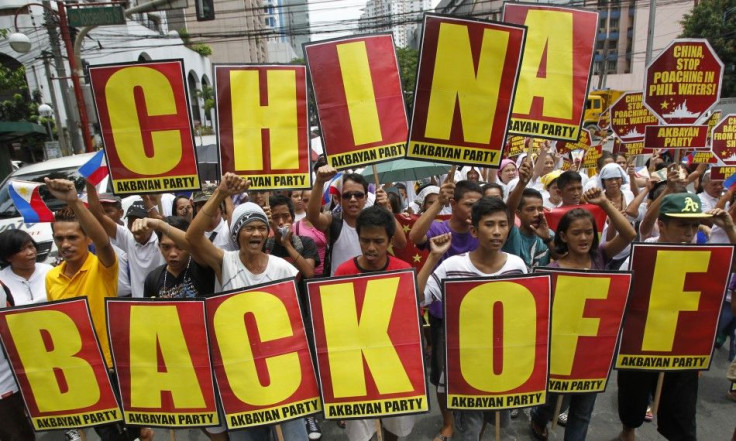China-Philippines Standoff Likened To David Vs Goliath: Safety Alert Issued Over South China Sea Protests

Hundreds of protestors in the Philippines took to the streets outside the Chinese embassy in Manila demanding that China withdraw its ships from the region.
The Philippines deployed more than 100 policemen to tighten security ahead of the protests Friday, while Beijing and Taipei warned their citizens to stay safe.
Protesters belonging to the civil society and political groups were reported carrying placards saying, China stop bullying the Philippines, Make Peace Not War, and China: Scarborough Shoal Today, Tomorrow the World? One of the protesters, who grabbed a microphone, reportedly compared the standoff between Manila and Beijing to the biblical fight between David and Goliath, a BBC report said.
Though the Philippine authorities had expected over a 1,000 protesters, only about half turned up in the vicinity of the Chinese embassy.
Philippine officials said the demonstration was peaceful, except for an incident averted by the police, where a protester tried to burn a Chinese flag.
China also deployed security personnel outside the Philippine embassy in Beijing, but only a few protesters turned up.
Although China, Taiwan and Philippines have long been involved in this territorial dispute, claiming ownership of the shoal believed to be rich in energy resources, the recent standoff was triggered on April 10 when two Chinese ships thwarted the Philippines' effort to arrest several Chinese fishermen accused of illegally entering and poaching near the Scarborough area.
Recent military drills, involving nearly 7,000 US and Philippine forces, intensified the standoff which led to a top military publication in China warning that the US may be risking an armed confrontation by undertaking joint military drills with the Philippines.
To de-escalate the situation, Philippine President Benigno Aquino III pulled out a warship from the region on April 16, while a spokesperson of the Chinese embassy in Manila said that despite tensions over the disputed shoal, both sides agreed not to do anything to complicate or aggravate the situation.
China's growing maritime influence in the region has neighboring nations including Brunei, Malaysia, Vietnam and Taiwan worried over territorial confrontations.
China lays claim to almost the entire South China Sea, including what is recognized by the UN as the Exclusive Economic Zone of other neighbors, according to reports.
Meanwhile, the safety alert affected tourism adversely as the Chinese mainland travel agencies stopped sending tourists to the Philippines due to security concerns, a China Daily report said.
Major travel agencies operating in the Chinese mainland have suspended tours to the Philippines, replacing them with safer destinations in the region like Thailand, Malaysia or Singapore, it is reported.
The Chinese state media has aggressively covered the issue, warning that the protests may harm bilateral ties, and has pledged not to ease its rigid stance on the Scarborough shoal.
The US considers a modernized Chinese military a threat, and it has reassured allies that Washington would act to counterbalance China's growing influence on the South China Sea as part of its foreign policy known as the pivot to Asia policy that was developed in the aftermath of the wars in Iraq and Afghanistan.
In an article published in November in Foreign Policy magazine, titled America's Pacific Century, November, Secretary of State Hillary Clinton said that the future of politics will be decided in Asia.
In the next 10 years, we need to be smart and systematic about where we invest time and energy, so that we put ourselves in the best position to sustain our leadership, secure our interests, and advance our values, Clinton wrote. One of the most important tasks of American statecraft over the next decade will therefore be to lock in a substantially increased investment -- diplomatic, economic, strategic, and otherwise -- in the Asia-Pacific region.
The United States' shift in strategic focus to the east and its entry into the South China Sea issue has provided the Philippines with room for strategic maneuver, and to a certain extent increased the Philippines' chips to play against us, emboldening them to take a risky course, the Liberation Army Daily, the chief mouthpiece of China's military was quoted by Reuters.
Analysts say the South China Sea is increasingly being considered as something akin to the Persian Gulf. Aside from the issue of sovereignty, energy security is also a major factor behind these competing claims, veteran Filipino journalist Chito Sta. Romana writes. He says growing tensions between China and the US in the Asian region provide a strategic context that complicates the regional situation, adding that it is difficult to expect an end to this diplomatic tug-of-war in the near future.
© Copyright IBTimes 2025. All rights reserved.






















